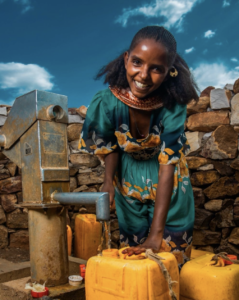In discussions about women’s health, access to clean water is a fundamental yet often overlooked factor. While cutting-edge femtech innovations capture headlines, the basic necessity of clean water remains a critical challenge for millions of women worldwide. In a recent interview Michelle Riewer, Director of Programs and Operations at charity:water, a non-profit organization dedicated to bringing clean and safe drinking water to people in developing countries, sheds light on this crucial intersection.

The Far-Reaching Impact of Clean Water on Women’s Health
Access to clean water profoundly affects women’s health in multiple ways. Without clean water, managing menstruation becomes a significant challenge. Women and girls often miss school or work during their periods due to lack of proper sanitation facilities and the inability to clean themselves or their clothes. The ability to maintain personal hygiene is crucial for dignity and self-esteem. Clean water allows women to bathe regularly and keep their clothes clean, reducing stigma and improving mental health.
In many communities, women and girls are primarily responsible for water collection. This task often involves carrying heavy loads over long distances, leading to physical strain and reducing time available for education or economic activities.
Clean water is also essential for safe childbirth and postnatal care, reducing the risk of infections and complications during pregnancy and after delivery. Moreover, access to clean water significantly reduces the risk of waterborne diseases, which disproportionately affect women as primary caregivers in many societies.
charity:water’s Approach to Water Access
charity:water takes a unique approach to addressing this critical issue. The organization works with 57 local partners across 22 countries in Africa and Asia, recognizing that local solutions are most effective for local problems. Their support ranges from deep boreholes in India to rainwater harvesting in the Thar Desert, with water access solutions tailored to each community’s specific needs.
While focusing on water, charity:water recognizes the importance of a holistic approach. Their programs often include sanitation facilities and hygiene education, addressing the full spectrum of WASH (Water, Sanitation, and Hygiene) needs. In recent years, menstrual hygiene has become a central part of charity:water’s programs, and community engagement is a key aspect of the organization’s strategy, particularly in breaking stigmas around menstruation. Their programs often include education for both women and men to normalize conversations about menstrual health.
The Intersection of Innovation and Basic Needs
While women’s health innovations continue to advance, charity:water’s work reminds us of the critical importance of addressing basic needs, especially in resource-limited settings.
Michelle Riewer, Director of Programs at charity:water, emphasizes the transformative power of clean water: “When you invest in clean water, you lift everybody up. People dream bigger. You see so much more opportunity. It’s an incredible investment.”
So as we celebrate advancements in women’s health, I believe it’s crucial to remember that for millions of women, access to clean water remains a fundamental need. Addressing this issue is not just about health; it’s about dignity, education, and unlocking human potential. The work of organizations like charity:water serves as a powerful reminder that sometimes, the most impactful innovations are those that address our most basic needs.



